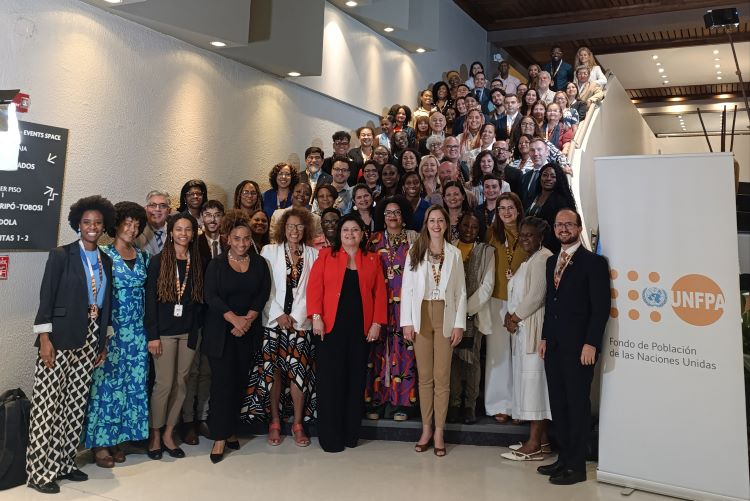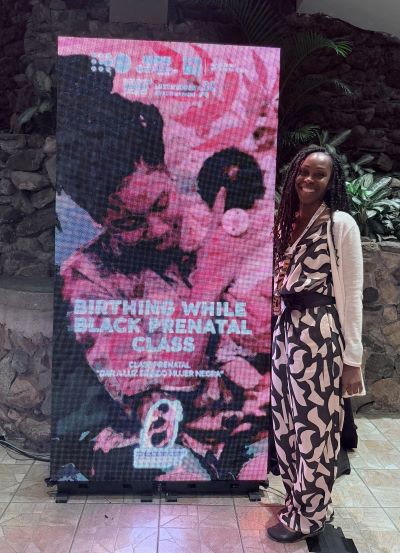Building global connections in black reproductive health

July 23, 2025
By Althea Jones, RM, AOM President
Earlier this month, I had the honour of attending the UNFPA Global Symposium for Bridging the Gap in Sexual and Reproductive Health of African Descent Women and Girls, held in San José, Costa Rica. It was a rare and powerful opportunity to connect with global leaders, practitioners and advocates committed to advancing Black reproductive health and justice. Representing Ontario midwives on an international stage was deeply meaningful, and a reminder that the work we do locally is part of a broader collective movement toward health equity.
I contributed to the poster exhibit with a poster highlighting the Birthing while Black (BwB) course, a culturally grounded online prenatal class created by Ancestral Hands Midwives for the Black community. A particularly meaningful moment was realizing that while my poster was on display in Costa Rica, in-person BwB classes were taking place simultaneously in my clinic back home. It was a powerful reminder of the local and global impact of this work.

I was also asked to join a panel discussion on the challenges of collecting accurate data on Afro-descendant populations. I’ll admit, I was initially nervous. Would the Canadian context resonate with a global audience? But after just one session, it became clear: the inequities in Black sexual and reproductive health transcend borders. Data gaps, systemic racism and underinvestment in culturally appropriate care are universal issues. That realization shifted my perspective. This was not just another conference; it was a rare and necessary space to connect globally around the issues we’re all grappling with.
The symposium brought together presentations, panel discussions, videos, networking, collaborative workshops and even a field visit to Limón to observe health care on the ground. While the official language of the event was Spanish, simultaneous translation in Portuguese and English made participation possible for everyone. It was my first time navigating a trilingual event, listening to live translation while using Google Translate on the slides. The logistics were no small feat, but the result was a gathering that truly reflected the global scale of the issue.
Data gaps, systemic racism and underinvestment in culturally appropriate care are universal issues. That realization shifted my perspective. This was not just another conference; it was a rare and necessary space to connect globally around the issues we’re all grappling with.
Participants came from across Latin America, the U.S., the U.K. and beyond. I met one other midwife from Colombia and, as far as I know, I was the only Canadian in attendance. The diversity—in geography, language and professional background—was a highlight. Too often, discussions on Black health, especially in Canada, happen in silos: Black women speaking to other Black women. At this symposium, it was refreshing to see a diverse mix of people, including allies, working to dismantle anti-Black racism in health care. True health equity requires everyone at the table, not just those directly affected. This gathering reflected that.
Our field visit to Limón offered a unique window into Costa Rica’s frontline health care. After a briefing at the government department of women, we split into language groups and headed to different hospitals. My group toured a facility just steps from the Caribbean Sea, where some areas of the hospital were open-air and patient rooms had beautiful ocean views—a stark contrast to the hospital settings I'm used to.
Local health-care providers walked us through the labour and delivery unit, which sees about 3000 births a year. The setup reminded me of triage units in Canadian hospitals: a row of beds separated by curtains. Birthing people are moved to the OR for delivery, and while the hospital has 24/7 C-section capability, epidurals aren’t offered for vaginal births. Midwives are integrated into the hospital team, focusing on labour management and low-risk deliveries. Their C-section rate is around 16%—notably lower than Ontario’s provincial average of 32%, and even below the 22% average for clients receiving Ontario midwifery care. They’ve also created a residential space for patients who travel from remote areas, allowing them to rest and recover before their long journey home. It was fascinating to see how resourceful and patient-centered care can look in a different system.
Health equity isn’t just an abstract goal; it’s a commitment to ensure every person, regardless of race, geography or income, receives the care they need and deserve.
What moved me most throughout the symposium were the stories of grassroots efforts around the world. I met professionals working to reduce teen pregnancy through education and advocacy, and one inspiring woman leading efforts to expand access to abortion care for Costa Ricans facing systemic barriers. These weren’t just information exchanges; they were affirming conversations. They reminded me that while the challenges we face in Black reproductive health are daunting, we are not alone in this fight.
Health equity isn’t just an abstract goal; it’s a commitment to ensure every person, regardless of race, geography or income, receives the care they need and deserve. This symposium brought that vision to life. It demonstrated the power of cross-cultural collaboration, of sharing tools, knowledge and strategies that can be adapted and implemented in our own communities.
I came home feeling energized and inspired. The connections made, the ideas exchanged and the solidarity built are the foundations of global progress. For those of us working to improve Black sexual and reproductive health, the journey can feel isolating. But among people from around the world, all driven by the same purpose, I was reminded: we are part of something much bigger.
